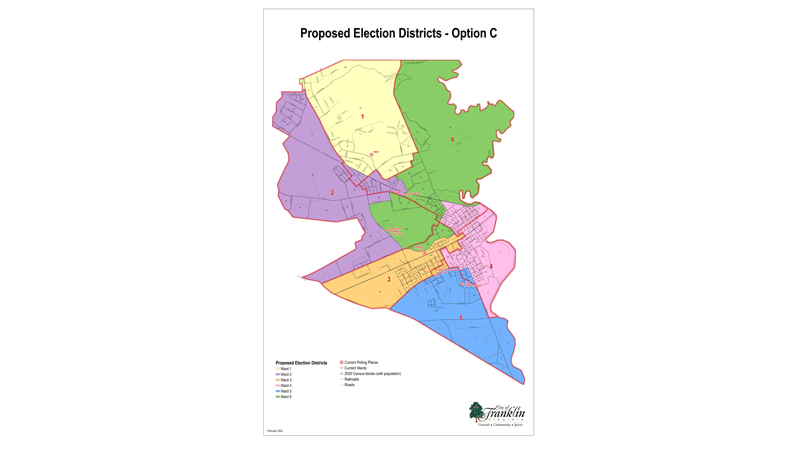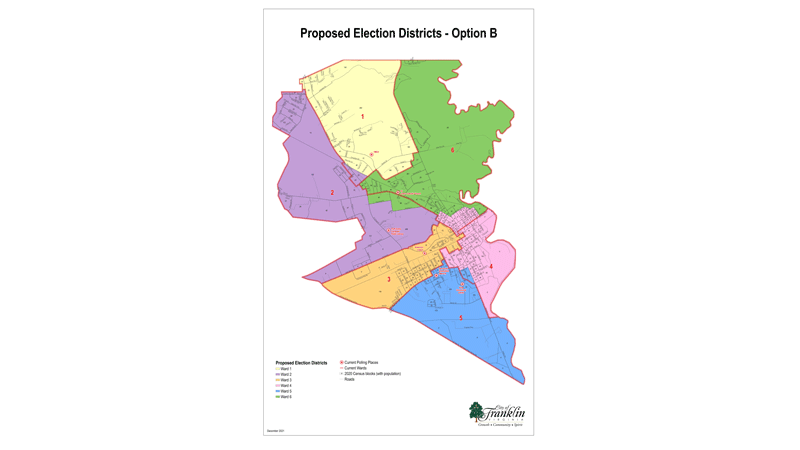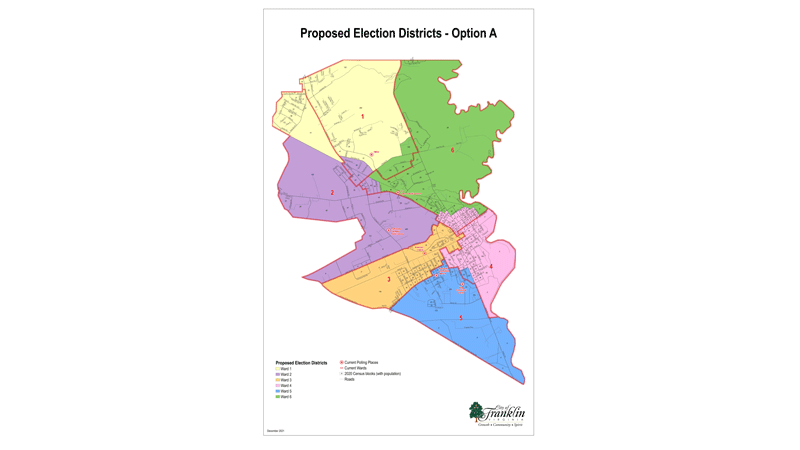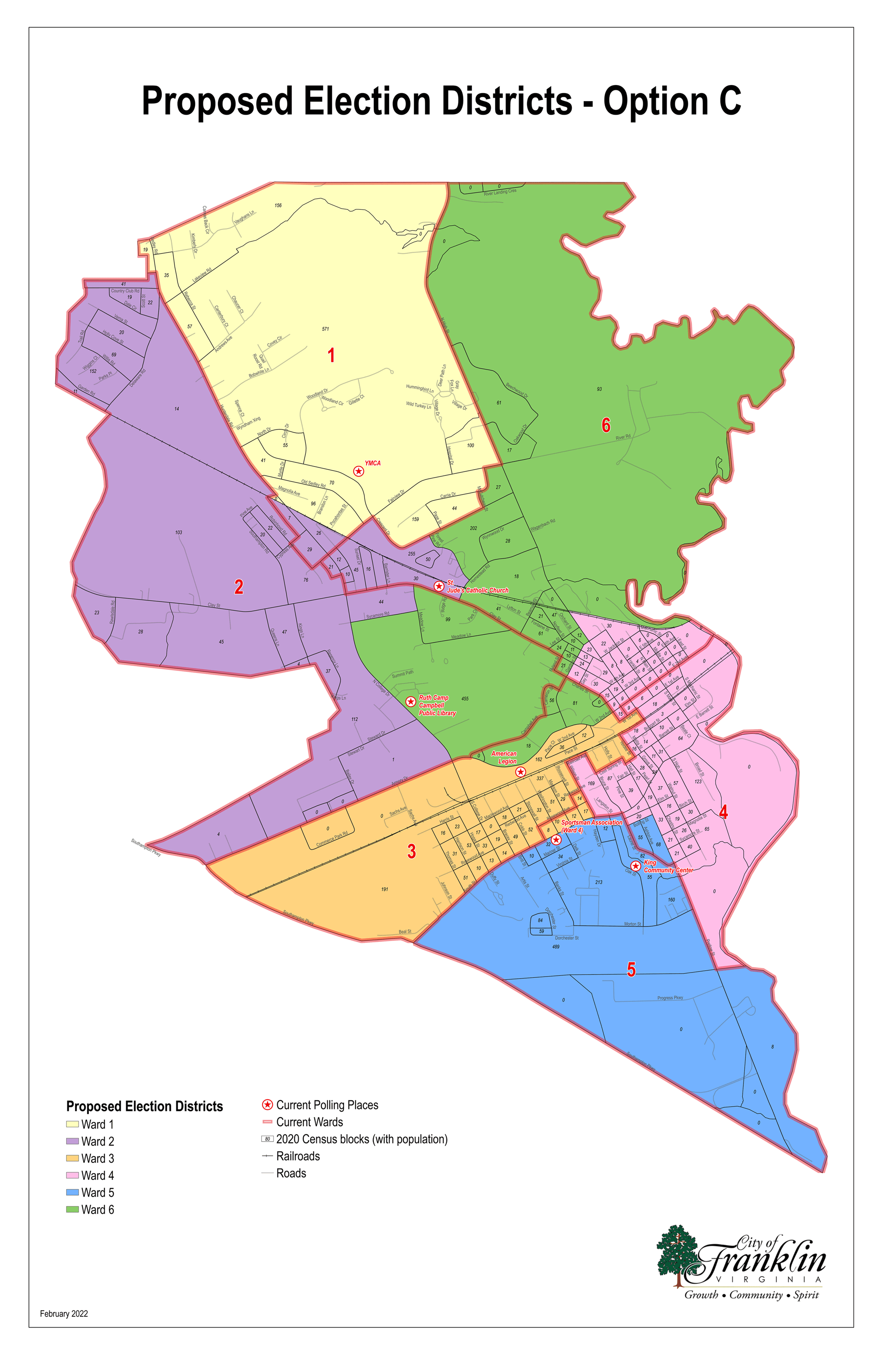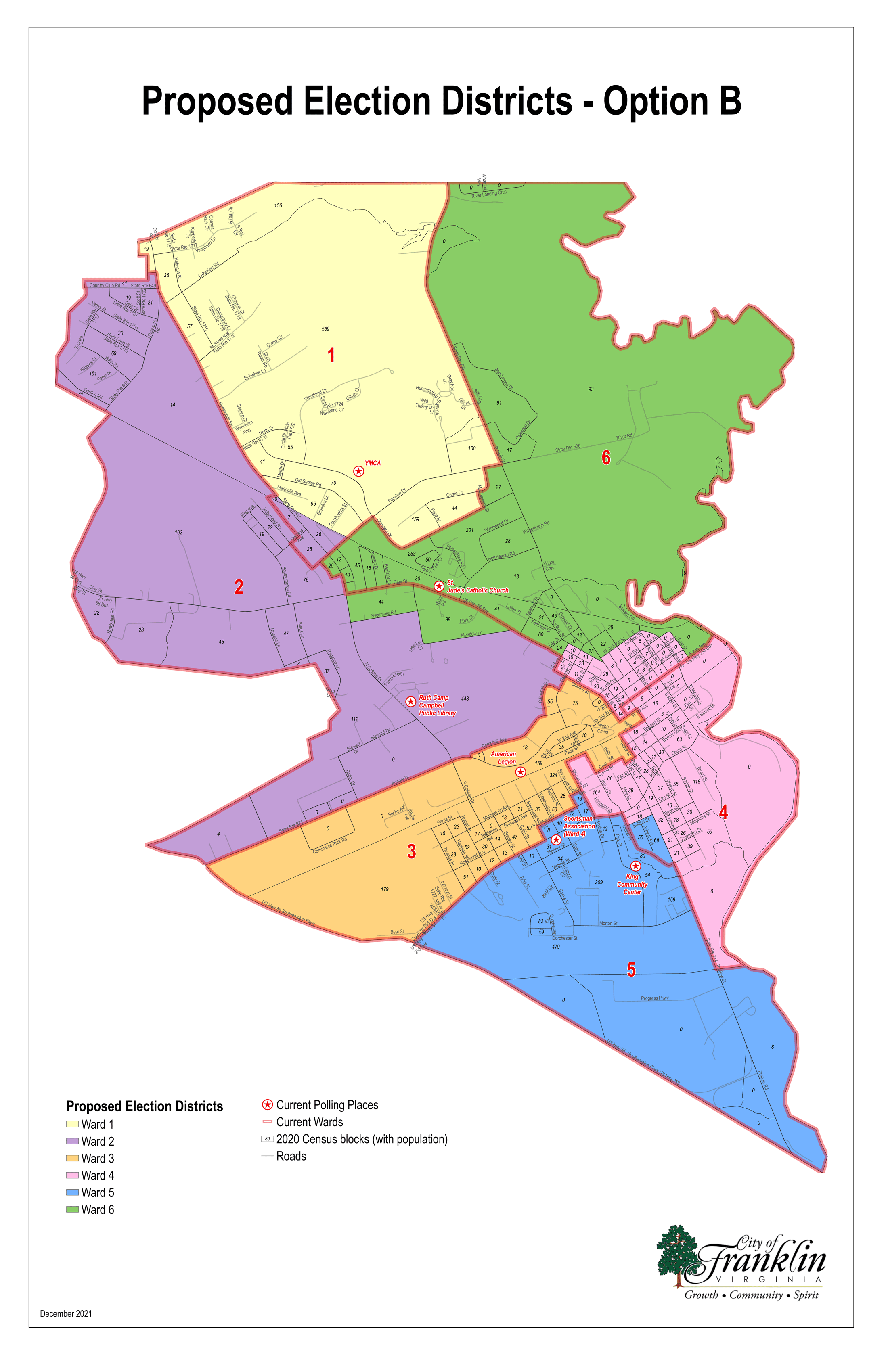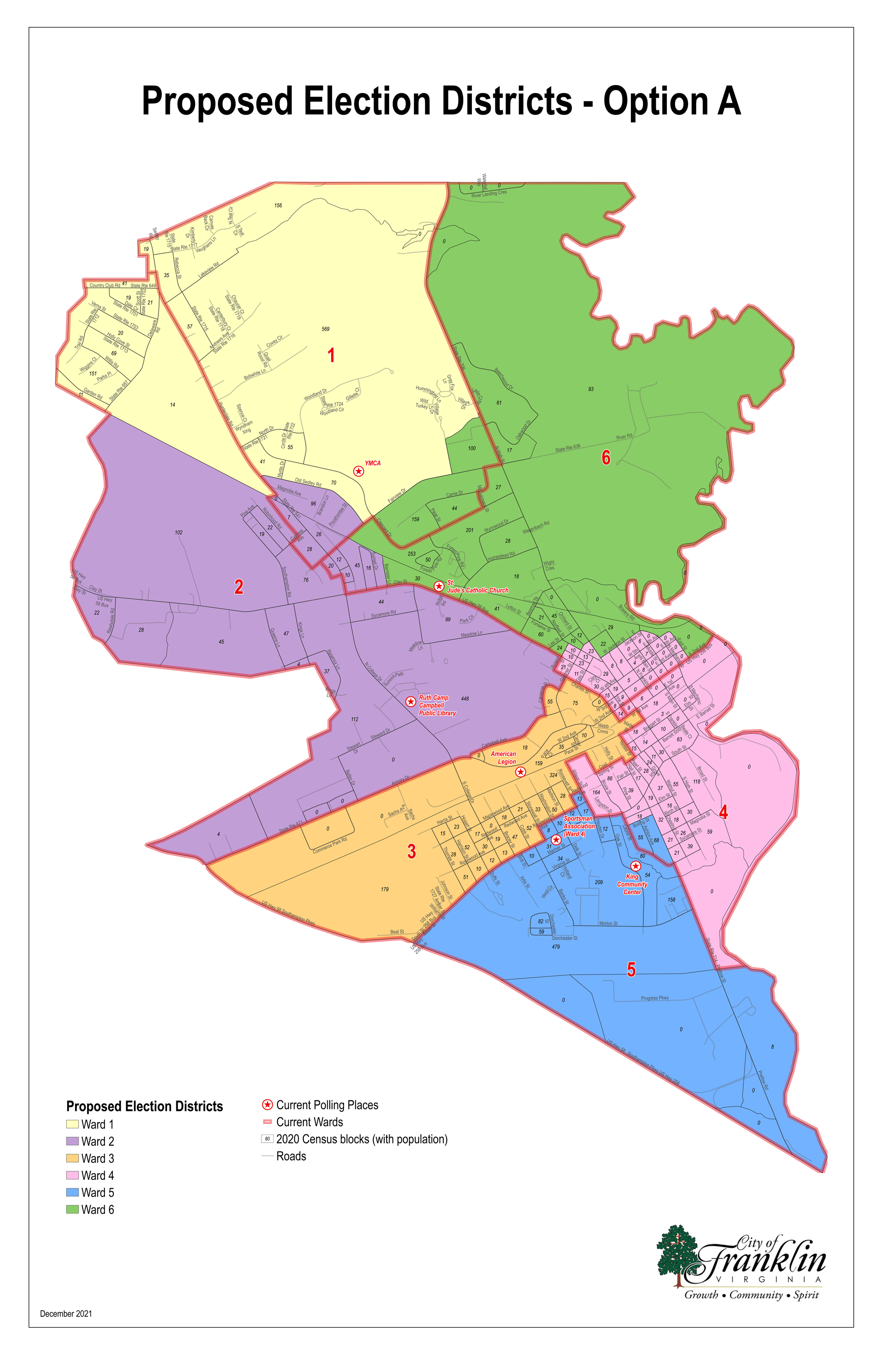Franklin City Council undecided on redistricting
Published 12:02 pm Friday, April 29, 2022
|
Getting your Trinity Audio player ready...
|
The Franklin City Council did not arrive at a decision Monday, April 25, on which of the three proposed redistricting maps would be approved.
A vote on Map C resulted in a 3-3 tie, with Vice Mayor and Ward 6 Councilman Robert “Bobby” Cutchins abstaining. Voting to approve Map C were Ward 3 Councilman Gregory McLemore, Ward 4 Councilman Dr. Linwood Johnson and Ward 5 Councilwoman Wynndolyn H. Copeland. Voting against approval of Map C were Ward 1 Councilman Mark R. Kitchen, Ward 2 Councilman Ray Smith and Mayor Frank M. Rabil.
Kitchen then made a motion to approve Map B, but it failed for lack of a second.
“So, we are at an impasse,” Rabil said. “We will bring this back up at our next meeting and call for the question again.”
Near the end of the meeting, Rabil said the discussion on the redistricting issue would continue at the council’s next meeting, which he said would be May 9.
“What will we discuss?” Kitchen asked.
Rabil replied, “We have to do something one way or the other, or the courts are going to come up with it for us.”
“Might not be a bad idea,” Kitchen said.
McLemore said, “And we can at that time vote to allow the court to do it at that meeting?”
“I’ll have to check on that,” Rabil said. “I really don’t know the answer to that question.”
A second public hearing on the proposed redistricting maps preceded the council’s discussion and motions on the matter.
Six members of the public spoke. Four spoke in favor of Map C, with most stating that it was because it better represented the population. One person spoke in favor of Map B, and another indicated that either Map A or B should be considered.
Among the four speaking in favor of Map C was attorney Jim Ellenson. He opened his comments by highlighting his 41 years of legal experience.
“I do not know the numbers of the population here, but if it is 5,000 Black and 3,000 White, then I don’t see how A and B are ever going to pass muster,” he said.
In a staff report addressed to the council, Franklin City Manager Amanda C. Jarratt noted that Maps A and B maintain three majority minority districts, as is the current scenario under the 2010 final districts. In Map C there are four majority minority districts.
Map C would take Smith out of his ward, unseating him from the council. Smith said during the council’s April 11 meeting that he would certainly not vote for a map that votes him out of his own district.
In his closing comments Monday night, Ellenson said, “I would also say to you, those that are going to vote for A and B, if you’re sure they’re constitutional, you don’t have a city attorney, you’re taking advice from a non-lawyer, you can be held personally liable.
“I heard somebody said something about, ‘I don’t want to vote myself out of a job,’” he continued, “but you might be voting yourself out of a house, you might be voting yourself out of your savings, you might be voting yourself out of everything, because if you get sued and they go after you personally, woe be unto you.”
When asked Tuesday, April 26, about Ellenson’s comment that Franklin does not have a city attorney, Jarratt said he is incorrect. She noted that the city utilizes the Sands Anderson law firm, and Vivian Seay Giles, of that firm, is assigned to the city.
Giles was present at Monday’s meeting.
Kitchen opened council comments by saying, “As I stated two weeks ago, I left it up to a cross-section of Ward 1. I said I was going to reach out to a hundred of my citizens. I reached out to 103.”
He said that there were 20 votes for Map A, 78 for Map B and four for Map C, with one abstention.
Copeland said, “As I stated at our last meeting, I also support Map C. It reflects the population, it reflects our citizens, so again, I support Map C.”
Smith also reiterated some of his points from the April 11 meeting.
“I made myself clear at the last meeting,” he said. “This is the only time I can find to read that redistricting caused people to be taken out of their seat. I want to vote B because I’m not going to vote myself out of a job. The citizens elected me to do this. I wasn’t self-appointed, so I should do what the citizens want.”
He said most of the people he has talked to do not care.
“And if nobody goes out to vote, it doesn’t matter what ward you’re in,” he said. “I also stated that last time.”
McLemore complimented Kitchen for reaching out to his constituents in Ward 1.
Then, McLemore highlighted the speakers from the public were divided, with one group wanting Map A or B and the other group wanting Map C.
“That’s a reflection of America, unfortunately, and I happen to be part of a group who is oftentimes historically marginalized,” he said.
He noted that things, including voting districts, should evolve and get better with time.
“So to leave things the way they are is to say, ‘Let’s do things the way they were done 20 years ago, 25 years ago maybe,’ because I’ve been on council for at least 12, and I’m the only one that was here during redistricting last time,” he said. “And the African American community has been marginalized in the past and was about to be marginalized with the two maps that we had to choose from.”
He said that the council was initially presented with only Maps A and B, which did not affect his ward at all.
“Redistricting is supposed to address the mobilization of the population and all of the districts are supposed to be plus or minus 5%,” he said.
As noted in the staff report to the council, one of the requirements for drawing new district boundaries is that boundaries must not be drawn that would deviate from the ideal number of residents in a district by more than 5% or by less than 5%.
“When you talk about the population and percentages, you’re talking about people, and with the exception of a few, there are 5,000 African Americans living in the city of Franklin and 3,000 non-African Americans,” McLemore said. “So if you have an equal divide of representation, that means the 3,000 is getting the same thing as the 5,000, and I’m no mathematician, but that doesn’t quite sound right. It would seem to me that the larger group should be able to have a little more representation than the smaller group, particularly when we have the numbers so close, plus the 5%.”
McLemore then mentioned that Map C was introduced to the council after Maps A and B.
He said he had never seen Ellenson before Monday, but he said, “We might have been looking at some sort of a lawsuit with the ACLU or the federal government because the population was not being represented with Map A and B. It represented the minority having equal to majority say over the majority of the population.
“If we are to strive to eradicate the cancer of racism in our nation, we need to recognize these people should have an opportunity to be represented,” McLemore continued. “That has nothing to do with who is elected. You can have a majority African American district and a non-African American has the opportunity to be elected.”
He said that as far as the districts are concerned, as long as they are plus or minus 5%, all three of the maps have been deemed legal.
“I feel that Map C is the only map that we have to select from that represents the population,” he said.
He suggested that Smith should not vote.
“I would say that he personally is involved in this situation because his seat has been drawn out, so he has a personal interest in this vote,” McLemore said. “Therefore, I would say that my colleague should recuse himself from this vote.”
McLemore concluded his comments by saying, “I would urge my colleagues to not do what has been traditionally done and railroad a certain group of people but what’s fair. Give them what’s their due, their representation, and I would urge my colleagues to vote for Map C.”
Johnson noted that through the years, the demographics have changed drastically so the city now has 5,000 Black citizens and 3,000 non-Black citizens.
“I’ve worked with 35 other cities,” he said. “All of those cities, plus the cities in Hampton Roads, have shown the demographics of the population that they have.
“Now a city needs to grow, and God knows we need to grow this city, and the only way we’re going to do that is recognize the numbers,” he continued. “Recognize the numbers that are there. The numbers do not lie. Other municipalities are doing that. We don’t want to be left out, sticking out like a sore thumb and people saying, ‘Oh, Franklin is just the good ol’ boy system’ and so forth. We don’t need that. We have passed that. We are beyond that. We are citizens working together to make this city great, and the only way we’re going to do that is look at the maps.
“And as the attorney spoke, basically you don’t know — people can file suit, and you could be in trouble,” he continued. “This is nothing to play with. Map C shows the numbers. Map C shows that we can move forward.”
Rabil cited the low voter turnout in recent elections, hovering around 20%.
“The numbers bear it out,” he said. “If you want to elect people, get out and vote. It doesn’t matter which ward you’re in, it doesn’t matter how the wards are sitting. It’s our opportunity and our right to get out and vote. That’s what’s going to make a difference. The way we redistrict this thing is not going to make a difference.”
Kitchen said, “The other municipalities that have been mentioned tonight, do we really want Franklin to be like them?”
In reference to Ellenson’s comments, Kitchen said, “And what I perceived as a vague threat of legal action was nothing short of a bullying tactic.”
McLemore said, “If it doesn’t make a difference about the lines, why would there be an objection to the lines that favor the population?”
Cutchins said, “I don’t think the vote of these maps tonight will decide any kind of way — A, B or C — to bring the peace to this city that I would like to see.”
He later added, “I don’t agree with the way C was portrayed to be brought onto the council and brought forward. Do I see it? Yes I do, but that’s my opinion. I do not see a way that any of this is going to resolve any matters that we have in this city.”
Johnson said, “We’re looking for peace among all people, no matter what the race is. We can work this out, but it takes working together, and to make a start, a beginning of working together of what’s right, and the only thing that’s going to do that is tonight, starting with Map C and moving forward.”


